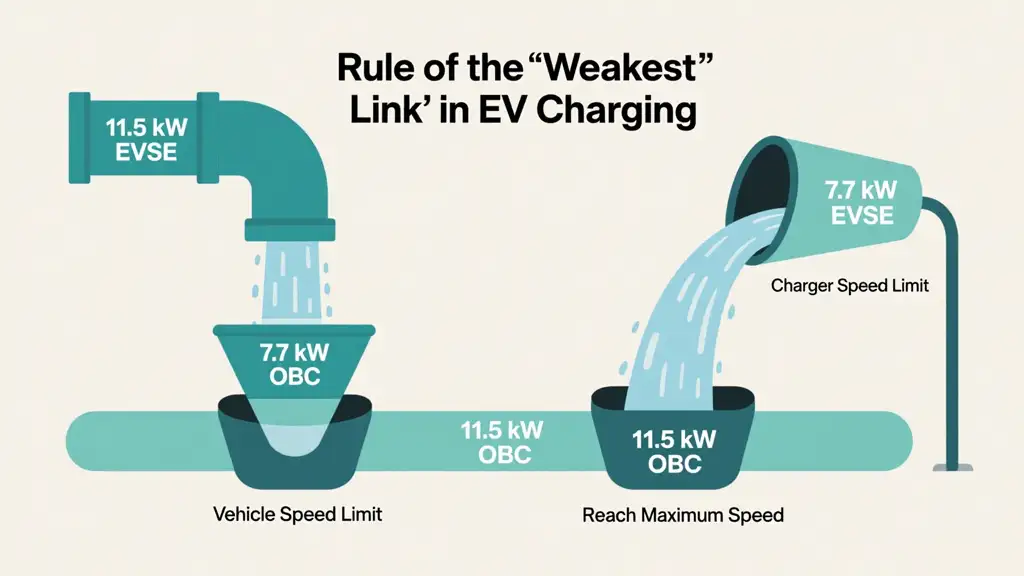You’ve just parked your new electric vehicle at a public charger. You plug in the connector and see the screen light up: “Charging, 7.2 kW.” But your friend, who drives a different EV, says they get 11.5 kW from the same model of charger. Why?
Welcome to one of the most common points of confusion for new EV owners. Understanding the true J1772 Charging Speed is key to managing your time and your vehicle effectively. While many talk about the different charging speeds, it’s essential to first understand the basics of level 1 2 3 charging to see the bigger picture.
This guide will demystify Level 2 charging speed once and for all. We will uncover the three key factors that determine how fast your car really charges and explain the one simple rule that governs it all. By the end, you’ll be an expert.
Before we talk about speed, let’s cover the basics. In simple terms, understanding how do car charging stations work is about knowing they are sophisticated devices that safely transfer AC power from the electrical grid to your car. The speed of that transfer is what we’re here to explore.
The J1772 is the standard plug used for AC charging across North America (Canada and the USA) for all electric vehicles, except for Teslas (which use a simple adapter to connect). It’s one of several charger connector types you’ll see globally.
When people ask about J1772 Charging Speed, they are almost always talking about Level 2 charging (240V), as Level 1 is too slow for anything but overnight top-ups.

Here is the secret that most guides don’t tell you. Your charging speed isn’t determined by just one thing. It’s a conversation between three components.
The “charger” you install on the wall or see in a parking lot is technically called Electric Vehicle Supply Equipment (EVSE). Its job is to supply AC power. Its maximum power output is measured in kilowatts (kW), which is determined by its amperage rating.
Here are the most common Level 2 charger specifications:
| Circuit Breaker | Max Charger Output | Power Output (@240V) |
|---|---|---|
| 40 Amps | 32 Amps | 7.7 kW |
| 50 Amps | 40 Amps | 9.6 kW |
| 60 Amps | 48 Amps | 11.5 kW |
A more powerful charger can offer more speed. But it doesn’t mean your car can accept it.
This is the most misunderstood part of the equation. Every electric vehicle has an “On-Board Charger” (OBC) built into it. Its job is to take the AC power from the charging station and convert it into DC power that the battery can store.
This means that even if you plug a Nissan LEAF into a powerful 11.5 kW charger, it will never charge faster than its 6.6 kW limit.
This is a simple one. The electrical circuit the charger is connected to must be able to safely provide the required power. A licensed electrician will always ensure this during installation, so it’s rarely the limiting factor in a proper setup.

Think of it like pouring water. The charger is a wide pipe, and your car’s OBC is a funnel. The flow of water will always be limited by the narrowest part of the system.
This “Weakest Link Rule” is the key to understanding your true j1772 charging speed. Let’s see it in action:
| Charger (EVSE) Power | Car (OBC) Power | Actual Max Charging Speed | The “Weakest Link” Is… |
|---|---|---|---|
| 11.5 kW (Powerful) | 7.7 kW (Standard) | ~7.7 kW | The Car |
| 7.7 kW (Standard) | 11.5 kW (Powerful) | ~7.7 kW | The Charger |
| 11.5 kW (Powerful) | 11.5 kW (Powerful) | ~11.5 kW | A Perfect Match! |
Now that you understand the “why,” here is the “what.” This chart translates the actual charging power (kW) into the approximate range you can add to your vehicle each hour.
(Note: These are estimates. Actual range depends on your vehicle’s efficiency.)
| Actual Charging Power | Kilometers of Range Added Per Hour |
|---|---|
| 3.8 kW | ~20 – 25 km |
| 7.7 kW | ~40 – 50 km |
| 9.6 kW | ~50 – 65 km |
| 11.5 kW | ~65 – 80 km |
For businesses, choosing the right charging speed is a strategic decision that affects customer experience and cost. Selecting the right power level is a key part of your overall ev charging station design.
The next time you wonder about your j1772 charging speed, remember the “Weakest Link” rule. Your true speed is not just about the charger; it’s a partnership between the charger’s power and your car’s ability to accept it.
By understanding both, you can set realistic expectations for every charge. And for businesses, you can now make an informed decision, investing in the exact right charging speed to meet your customers’ needs and maximize your return.
Θα σας στείλουμε λεπτομερείς τεχνικές πληροφορίες και προσφορά!